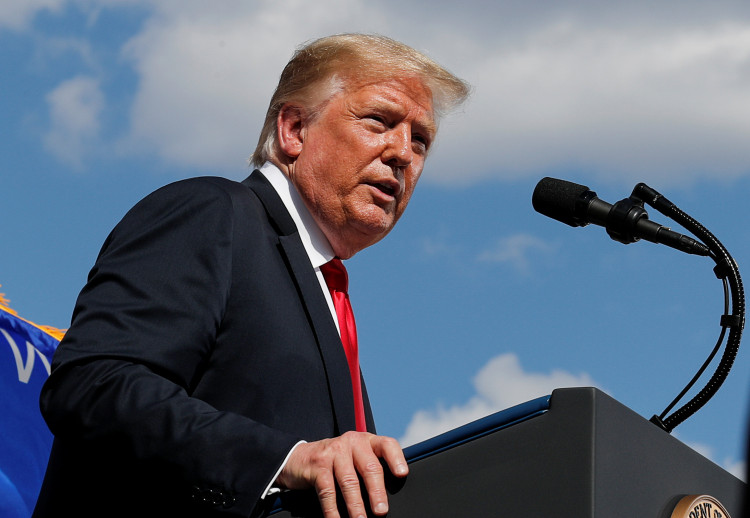Former President Donald Trump has drawn fierce criticism by claiming Ukraine "should have never started" the conflict that has claimed tens of thousands of Ukrainian lives since Russia's invasion in February 2022. Speaking at his Mar-a-Lago resort, Trump stated: "You've been there for three years. You should have ended it ... You should have never started it. You could have made a deal." His remarks echoed long-standing Russian narratives, prompting sharp rebukes from Ukrainian President Volodymyr Zelenskyy and other Western leaders.
Zelenskyy responded during a briefing in Kyiv: Trump "unfortunately lives in this disinformation space," adding that much of Trump's rhetoric mirrors Kremlin talking points that blame Ukraine for a war that most observers attribute to unprovoked Russian aggression. Russia began its full-scale invasion on February 24, 2022, launching missile strikes and sending troops across the border. Analysts note that Moscow had already instigated conflict in eastern Ukraine's Donbas region as far back as 2014, after illegally annexing Crimea.
Trump suggested Zelenskyy "is very low in Ukrainian Polls" and called him "a Dictator without Elections," despite Ukraine's constitution barring both presidential and parliamentary elections while martial law is in effect. Zelenskyy was democratically elected to a five-year term in 2019, and he has pledged to hold a vote once martial law ends. A Kyiv International Institute of Sociology survey published this month shows Zelenskyy's trust rating at 57%, a decline from the near 90% figure early in the conflict but still far above the "4%" Trump alleged.
Criticism of Trump's statements also came from Mike Pence, his former vice president, who posted on X: "Mr President, Ukraine did not 'start' this war. Russia launched an unprovoked and brutal invasion claiming hundreds of thousands of lives. The Road to Peace must be built on the Truth." As the war enters its third year, Ukrainian officials have dismissed claims that their government provoked the conflict, reminding the public that Russian President Vladimir Putin ordered troops to cross international borders under the guise of defending Russian speakers.
Zelenskyy has consistently condemned any suggestion that Kyiv shares blame for hostilities. Officials in Ukraine have emphasized the difficulties of holding elections during a period of mobilization, displacement, and continued missile strikes. Ukraine's Refugee Agency notes that millions of citizens are displaced or living abroad, making large-scale polling sites unfeasible. Additionally, with roughly 800,000 soldiers on active duty, removing them from front-line service to cast ballots is considered a security risk.
Trump's characterization of "millions of people killed" in Ukraine has also been refuted by Ukrainian and international sources. Zelenskyy recently estimated that over 46,000 Ukrainian soldiers have died since 2022, with "tens of thousands of civilians" killed in occupied territories. Russia's official statements put its own military deaths at around 6,000, though Western officials estimate higher numbers. Nowhere do credible analyses place total fatalities near the millions.
The notion that Ukraine initiated the conflict first emerged in Russian propaganda efforts, which have long denied Ukraine's sovereignty and historical independence from Moscow. Putin's justification for the 2022 invasion centered on what he called a need to "demilitarize and denazify" Ukraine, a claim widely dismissed by international experts and leaders. Harvard and Johns Hopkins scholars studying the region have labeled Russia's explanations "factually wrong" and part of a pattern aimed at dismantling Ukraine's legitimate governance.
PolitiFact, a U.S.-based fact-checking organization, deemed Trump's assertion that Ukraine started the war "Pants on Fire!" citing ample evidence of Russia's unprovoked incursion. Multiple scholars, along with Western intelligence reports, stress that Putin orchestrated large-scale exercises and troop buildups on Ukraine's borders before the February 2022 attack. Video footage from the early hours of the invasion shows Russian tanks and artillery rolling in as civilians fled major Ukrainian cities.
International talks in recent months have aimed at brokering peace, but these have involved varied stakeholders, including Saudi Arabian hosts and Russian envoys, while Ukrainians have voiced frustration at not always being part of negotiations. Nevertheless, Zelenskyy maintains he welcomes diplomatic solutions, so long as they respect Ukraine's sovereignty and territorial integrity. The war's toll continues to mount, with infrastructure damage, displacement, and civilian casualties at unprecedented levels for Europe since World War II.
Trump's insistence that Zelenskyy could have "made a deal" before the Russian invasion has angered Ukrainians who view Moscow's demands as an existential threat. Zelenskyy, who has repeatedly called for foreign assistance and steadfast Western support, said he plans to share poll findings on his popularity with Trump's team in the coming weeks. Observers note that the former president's remarks may further complicate U.S.-Ukraine relations, particularly if they gain traction among certain factions of the American electorate.
- Conflict Toll and Figures (Approximate):
- 46,000+ Ukrainian soldier deaths (Ukrainian estimate).
- "Tens of thousands" of civilian casualties in occupied areas.
- Over 6 million Ukrainian refugees registered worldwide.
- Russia's official claims: about 6,000 soldier deaths (Western estimates say higher).





